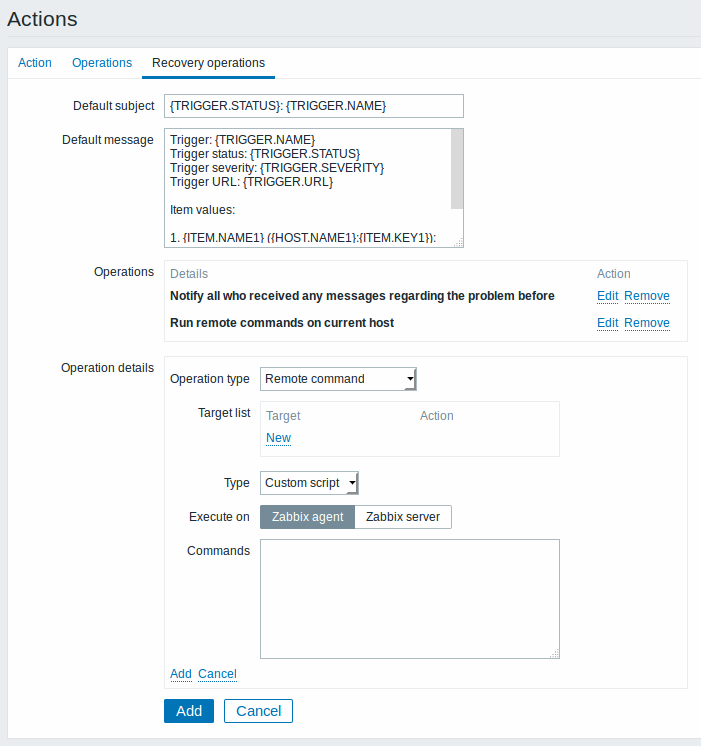This is the documentation page for an unsupported version of Zabbix.
Is this not what you were looking for? Switch to the current version or choose one from the drop-down menu.
Is this not what you were looking for? Switch to the current version or choose one from the drop-down menu.
Table of Contents
3 Recovery operations
Overview
Recovery operations allow you to be notified when problems are resolved.
Both messages and remote commands are supported in recovery operations. Recovery operations do not support escalating - all operations are assigned to a single step.
Use cases
Some use cases for recovery operations are as follows:
- Notify all users that were notified on the problem
* Select 'Send recovery message' as operation type
- Have multiple operations upon recovery: send a notification and execute a remote command
* Add operation types for sending a message and executing a command
- Open a ticket in external helpdesk/ticketing system and close it when the problem is resolved
* Create an external script that communicates with the helpdesk system
* Create an action having operation that executes this script and thus opens a ticket
* Have a recovery operation that executes this script with other parameters and closes the ticket
* Use the {EVENT.ID} macro to reference the original problemConfiguring a recovery operation
To configure a recovery operation:
- Go to the Recovery operations tab in action configuration
- Click on New in the Operations block
- Edit the operation details and click on Add
Several operations can be added.
Recovery operation attributes:

| Parameter | Description | ||||
|---|---|---|---|---|---|
| Default subject | Default message subject for recovery notifications. The subject may contain macros. | ||||
| Default message | Default message for recovery notifications. The message may contain macros. | ||||
| Operations | Recovery operation details are displayed. To configure a new recovery operation, click on New. |
||||
| Operation details | This block is used to configure the details of a recovery operation. | ||||
| Operation type | Three operation types are available for recovery events: Send recovery message - send recovery message to all users who were notified on the problem event Send message - send recovery message to specified user Remote command - execute a remote command Note that if the same recipient with unchanged default subject/message is defined in several operation types, duplicate notifications are not sent. |
||||
| Operation type: send recovery message | |||||
| Default message | If selected, the default message will be used (see above). | ||||
| Subject | Subject of the custom message. The subject may contain macros. | ||||
| Message | The custom message. The message may contain macros. | ||||
| Operation type: send message | |||||
| Send to user groups | Click on Add to select user groups to send the recovery message to. The user group must have at least "read" permissions to the host in order to be notified. |
||||
| Send to users | Click on Add to select users to send the recovery message to. The user must have at least "read" permissions to the host in order to be notified. |
||||
| Send only to | Send recovery message to all defined media types or a selected one only. | ||||
| Default message | If selected, the default message will be used (see above). | ||||
| Subject | Subject of the custom message. The subject may contain macros. | ||||
| Message | The custom message. The message may contain macros. | ||||
| Operation type: remote command | |||||
| Target list | Select current host, other hosts or host groups as targets to execute the command on. | ||||
| Type | Select the command type: IPMI - execute an IPMI command Custom script - execute a custom set of commands. You can select to execute the command on Zabbix agent or Zabbix server. SSH - execute an SSH command Telnet - execute a Telnet command Global script - execute one of the global scripts defined in Administration→Scripts. |
||||
| Execute on | Execute command on Zabbix agent or Zabbix server. | ||||
| Commands | Enter the command(s). | ||||
© 2001-2025 by Zabbix SIA. All rights reserved.
Except where otherwise noted, Zabbix Documentation is licensed under the following license

